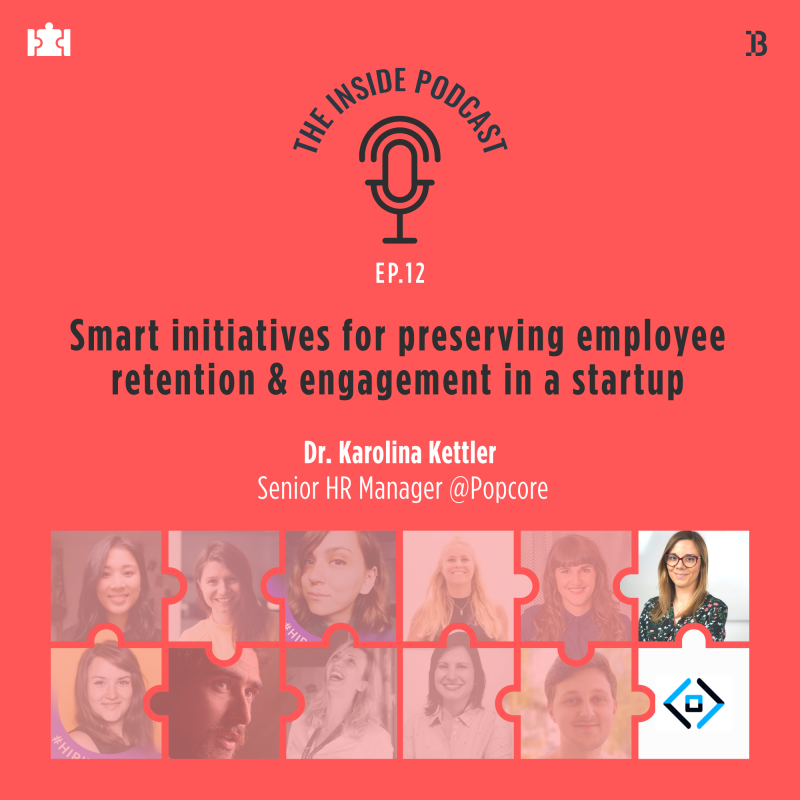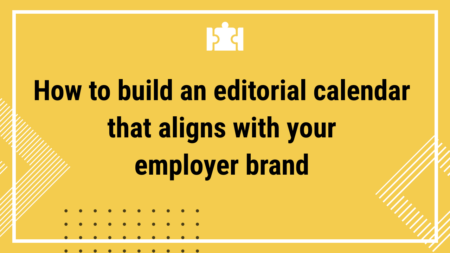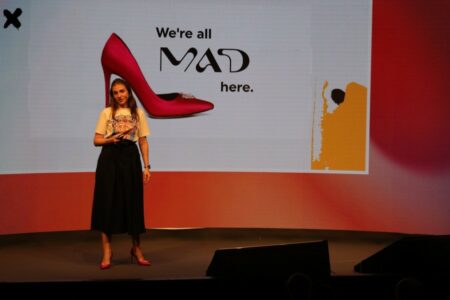Overview
In Ep. 12 of Employer Branding: The Inside Podcast you’ll be listening to Dr. Karolina Kettler, Senior HR Manager at Popcore, share her take on maintaining employee retention when working in a startup, but also about being transparent and empathic in life and in business overall, not just in HR.
What you’ll learn by listening
- How to maintain employee retention in a startup
- Tips & tricks for preserving a healthy company culture
- Why transparency matters the most, regardless of company size
- The importance of empathy in HR, in business & in life
- Perks of working in HR for a successful startup
- Why letting people go is tough, but necessary
About the company
Founded in 2018, Popcore creates beautiful, oddly-satisfying mobile games. The company embraces collaboration and trust that data and lean structures empower creatives, leading quick iterations and enabling the whole team to take full ownership of their projects. Popcore is backed by EQT Ventures, Makersfund, and David Helgason.
Enjoy listening to Ep. 12 of Employer Branding: The Inside Podcast on Spotify!
Podcast transcription – Preserving employee retention & keeping people engaged in a startup
Georgiana: Hi everyone! This is Georgiana and you’re listening to Employer Branding: The Inside Podcast where we talk to people from HR in general, talent acquisition, talent management, employer branding, and company culture. Today I’m talking to Dr. Karolina Kettler, who is Senior HR Manager at Popcore. Welcome, Karolina! Thank you so much for accepting my invitation.
Karolina Kettler: Hi Georgiana! Thank you so much for inviting me. I’m very excited to be here.
Georgiana: Please let me know Karolina, what do you do on a daily basis? And what does Popcore do?
Karolina Kettler: Of course, so maybe I’ll start with Popcore, and then I’ll jump to myself. Popcore is a really exciting company from Berlin that produces hyper-casual games. I don’t know if you are familiar with the gaming industry. Do you know what hyper-casual games are?
Georgiana: No. Is it the same as Candy Crush Saga? Those types of games?
Karolina Kettler: Popcore produces games that you play mainly on your mobile. They seem simplistic because of the way we play them. We don’t spend months getting to the next level. However, I wouldn’t say that developing those games is a simplistic thing. No, it’s a complex and very exciting process for everybody involved. For the user, it’s is a very nice and relaxing experience. To be honest, we actually received positive feedback on those types of games, and it turns out they helped many people to just sit down and relax. So I’m very happy that we have that positive impact. Regarding myself, I’m a leading talent acquisition at Popcore, and I’m also responsible for HR.
Georgiana: This brings me to my next question. What is it like to be an HR manager for a startup? Since you already mentioned you’re doing several things?
Karolina Kettler: Being an HR manager in a start-up basically means that you’re an all-rounder, right? My team and I are responsible for HR operations, but also recruitment, employer branding, learning and development, and sometimes office management. Everything falls on our plate, and we have to be able to jump from being very hands-on to getting our hands dirty so to speak. On a mental level, we must be able to analyze and set up processes. Personally, I find it very exciting to be an all-rounder.
Georgiana: Would you say that’s the best part about your job?
Karolina Kettler: This is the best part. I tried working in a corporate before and although I wouldn’t say it was a boring job because there were lots of positive things about working in a bigger and more structured organization. However, I like getting different inputs and be able to take care of things on different levels. In a smaller company like a startup, I enjoy that your job is much more impactful and you can really be a change driver.
Again, I’m not saying that you cannot be a change driver in a corporate environment, but everything happens on a different scale. In a startup, you can really start setting up processes that will change completely the way the company operates on a certain level in a very short period of time. And this is really exciting.
Georgiana: Okay, but there must have been also difficult moments in your career so far. So if you were to mention the hardest thing you’ve ever had to do, what would that be for you?
Karolina Kettler: In general, for me as an HR person, the hardest thing – regardless of the size of the company you work for – is the part of letting people go. This is the hardest part because I started my career as a recruiter. For me, it was always so amazing and fulfilling, and rewarding that I can actually bring people in. But when you’re also the HR, you have to also be on the other side and let people go.
I’m always trying to get this approach that those conversations and those processes shouldn’t be like purely offboarding processes. They should be really – and it’s something I didn’t just learn once on one of the HR conferences – that offboarding conversations should be more like onboarding on a new challenge. I always try to apply this approach and make people understand – apart from very rare extreme cases when an employee doesn’t fit – that the circumstances are just not working and that a certain environment is just not suitable for them.
Nobody should leave a conversation feeling that they don’t deserve a certain job. What I always do, I offer support, trying my best to recommend candidates that don’t fit by sharing their curriculum within my network. Sometimes people get very defensive and very angry. But I believe that properly conducted interviews can be positive regardless of the outcome.
Nobody should stay too long in an organization where it doesn’t work. It’s like being in a toxic relationship.
Karolina Kettler
Georgiana: And I guess sometimes you just have to rip the band-aid off, even if it hurts a little bit. I know, retention is difficult all around the world, and especially in tech, and especially in Berlin. How do you and your company deal with the competition?
Karolina Kettler: Well, it’s true that employee retention has been always been an issue for Berlin startups. And not only startups because if you look at companies in Silicon Valley, the retention rate (average lifespan of an employee) is 18 months on average.
First of all, we are quite young. We were established in 2018, but if I were to look at the numbers, our retention rate is quite good. It’s over 90%, which is really, really nice. What I truly believe is that we, at Popcore, have a lot to offer to our employees. We do have a great product and we are very successful. That’s really amazing and it doesn’t happen too often.
Also, we’re financially pretty successful. What matters the most – and I wouldn’t say we created it because it would sound as if our culture was already set in stone – is that we are in the process of creating a culture where results really matter. And it doesn’t really matter who is the source of a great idea. I think people really appreciate it. And I see this not only when speaking with our employees, but also when I conduct exit interviews with people who leave. Many have underlined that this was the most enjoyable part of working for Popcore. So this is how we keep people in our organization.
Georgiana: By telling me all this you sort of answered my next question, but I’m going to state it. So, maybe we can sum up what you said: what would you say are the three main tips for preserving a healthy company culture?
Karolina Kettler: Because we are in this exceptional growth phase and we have such a great mixture of people – those you started with as a very small company and the new ones – one thing you should have in mind is to never forget about the people with whom you started the company in the first place. It’s very easy to forget when new people are brought in, who may have more experience and will most likely help take the company to the next level. And that’s because new people have new, different processes than the processes your current team is used to.
It’s great that you’re focusing on recruitment and growth, but always involve people in them. Make them part of the hiring process, make them part, if possible, of the teams that are redesigning the structure. Never let them behind. Transparency is always the best. And especially now during COVID, and after working in the first phase in a hybrid mode – partially at the office, first at home, now we’re all at home. I think it’s very important to be a great communicator and not leave people behind.
Georgiana: I agree and not allowing for information to suggest itself. I think it’s connected to transparency. In the end, how important would you say is empathy in being an HR?
Karolina Kettler: I would say empathy matters in business in general, not only in HR. I don’t know if you read the book, Radical Candor (Kim Scott).
Georgiana: Someone else mentioned it to me in a podcast this week. I have to read it!
Karolina Kettler: You should read it. The most important learning from Radical Candor is that you have to challenge people directly. But in order to do it, you have to care personally. So without these personal carrying components, you cannot really build a successful and challenging environment. I truly believe in it, on both a personal and organizational level.
An organization can spend lots of money on hiring a top-notch external consultant. But as long as that person is not going to put him/herself in the shoes of the company, he/she won’t understand what the company and that group of people are really about. That approach will never be successful. I truly believe that empathy is not only important for HR professionals, but for business, too.
Never forget about the people with whom you started a company. It’s very easy to forget when new people with more experience come in. It’s great that you’re focusing on recruitment and growth, but make sure to include old employees in redesigning the structure of your company, as well. Never let them behind.
Karolina Kettler
Georgiana: And I would say even for human beings in general. If we all were a bit kinder and a bit more empathetic, I think we would be much better off. So is this the book that you would recommend to our listeners? Or do you have any other particular books that you liked?
Karolina Kettler: I would totally recommend writing Radical Candor. And in terms of other books, I would also recommend People over Profit (Dale Partridge). I really identify myself with a message that’s being said there.
Georgiana: Okay, Karolina, just to get to the end of our podcast, because time has almost run out. If you were to mention two companies that you think succeeded at employer branding and company culture, which would they be?
Karolina Kettler: I cannot mention any names, and it’s not because I don’t follow companies but because I’m really skeptical. I feel like from a marketing perspective, yes, campaigns are great. However, I think what matters most is how you treat your candidates and how you treat your employees. All the other things are just a nice addition. I know that some companies don’t always give personal feedback to candidates they reject. But we do, and I would say that’s great for our employer branding.
Georgiana: Ever since I’ve started this line of podcasts, I’ve sort of shifted my perspective when it comes to companies that are good and companies that are not so good. I get a feeling from the person who’s talking about the company if it’s a good culture and a healthy one or not. So I don’t really look for external branding, all that much. Although, you know, as a marketer, I tend to do it.
So yes, I think I understand where you come from, and I agree. 100%. Super, thank you so much for your time. Karolina, thank you for talking to me today. I look forward to meeting you. I tell that to all of my guests. I look forward to meeting you in person and to recording live at some point. Nice meeting you. And we’ll be in touch, bye!
This was Employer branding: The Inside Podcast. You can find our podcasts on Spotify, on Apple Podcasts, and content on employer branding-related themes on employerbranding.tech. Until the next time, stay tuned. Bye!






